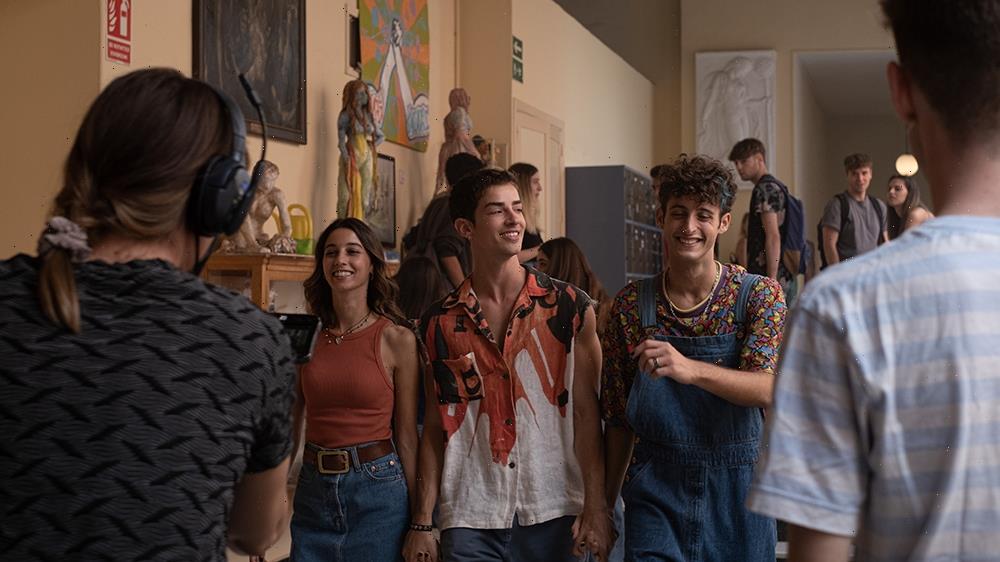Featured in the Spanish showcase at Series Mania, “Age Of Anger” (“La edad de la ira”) has the potential to grab viewers from all demographics as it tackles the fractured and complex inner workings of teenagers coming to terms with their complexities, amidst the investigation of a close-to-home homicide.
Produced and distributed internationally via Atresmedia TV and The Mediapro Studio, the series follows its protagonists as they negotiate the terms of their budding and unconditional relationship, one that toes the line between steadfast friendship and romance. Palpable rapport is felt between the characters as they traverse the classroom, where they’re provoked to unravel moral quandaries by a passionate professor and an extracurricular film studies group.
Shaped by lauded playwright and series writer Lucía Carballal (“Locked Up”), the characters boast immense depth as audiences are privy to their vulnerabilities, naivety, and maturity. Dealing with traumas larger than themselves, they unveil nuanced takes on age-old tropes, solving problems with grace and folly.
“The key to ‘The Age of Anger’ is that it tries to approach adolescence without condescension, that’s why we find complex characters, because adolescents are much more complex than what we usually see in many high-school series,” remarks Montse García, director of fiction at Atresmedia TV and executive producer of the show.
“This series portrays their fears, their insecurities, their doubts, their anger. Also their illusions, their dreams, their passions, their tastes. That’s why the protagonists of ‘The Age of Anger” are so complex,” she adds.
The four-part series divides the drama into acts devoted to each character’s perspective of unfolding events. Episode one introduces carefree and rebellious Sandra (Amaia Aberasturi), who becomes enamored with soon-to-be-tormented Marcos (Manu Ríos). Their young love meets uncertainty as the pair become friends with a new student, Raul (Daniel Ibáñez). Vague flash-forward sequences reveal the murder of Marcos’s father, in which he’s implicated, his brother (Carlos Alcaide) by his side. The four are settling into uncharted territory as the cast lends a multi-dimensional depiction of youth grappling with severe trauma while trying to hang onto a semblance of innocence.
“I want to recognize the great work of casting director, Luis San Narciso, and his team because they found what we were looking for with each character. We were looking for actors who could very naturally bring these characters to life and who were capable of showing nuance. That, in such young actors, is difficult to achieve,” says García.
Adapted from Nando Lopez’s novel of the same name, the show departs briefly from the book, creating its own identity to appeal to viewers.
“The most important thing is to keep the essence of the story and the characters, but I think it would be a mistake to make a rigid adaptation of the novel. The books have some narrative codes, the series and films others,” Garcia notes.
She went on: “For us, it’s been essential to have the advice of Nando López at all times. He knows this story and these characters better than anyone and has worked closely with both the writing team, the series director and the executive producers,” she adds, saying that Lopez understood that the series narrative had t be “from a different point of view, but complementary.
An episodic with mass appeal, “The Age of Anger” delves into collective concerns, alluding to the social fabric society tears and mends as it copes with life’s dilemmas.
“At Atresmedia, we’re experts in making series that are of interest to a wide audience, we’ve been making them for decades. It’s very complicated. On television there are no magic formulas for anything, even less so for this. We try to have a powerful story, with attractive characters the viewer can empathize with,” notes García.
“If the story of the series deals with universal themes such as love, friendship or adolescence, it’s feasible to reach a wider audience because who doesn’t identify with one of those teenagers from ‘The Age of Anger’?,” she concluded.
“Who hasn’t fallen in love in high school? Who hasn’t had insecurities at that age? No matter how old you are, it’s easy to understand the characters in the series.”
Source: Read Full Article





